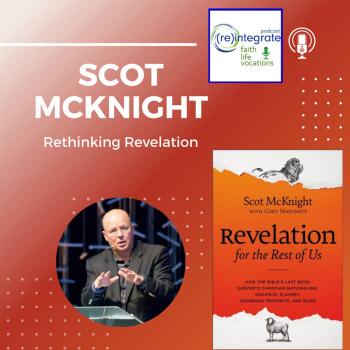 Sixth in a series on the Kingdom of God.
Sixth in a series on the Kingdom of God.
For many in the Reformed tradition, especially those who follow in the footsteps of Abraham Kuyper, God’s sovereign rule extends over every aspect of life. What this means, for these folks, is that the kingdom of God is not limited to the church. Richard Mouw writes,
“Kuyper makes much of the fact that the Kingdom of Christ is much bigger than the institutional church. The Kingdom is that broad range of reality over which Christ rules. Actually, Christ’s Kingdom is the whole cosmos — remember Kuyper’s manifesto about every square inch of the creation belonging to Jesus.” (Mouw, Abraham Kuyper: A Short and Personal Introduction)
What, then, do Kuyperians like Mouw say concerning the church?
“The institutional church is certainly an important part of Christ’s Kingdom. It is where we as believers gather to worship — where we are shaped by the preaching of the Word, by participation in sacraments, by instruction in the church’s traditions and teachings, and by less formal patterns of fellowship.” (Mouw, Abraham Kuyper: A Short and Personal Introduction, p. 57)
So it’s not, as some often caricature Kuyperians, that they have a low view of church.
But Mouw wants to make it clear that he believes that the kingdom of God is bigger than the church. Mouw continues:
“But the church is only one part of the Kingdom. And it is no trivial thing to point that out. I once heard a prominent pastor complain from the pulpit about lay people — he used the example of Christians in the business community—who don’t give enough of their time to church activities. This is how he put it: ‘These folks work all day at their marketplace jobs, and then they go home and watch television. Other than coming to Sunday services,’ he said, ‘they don’t seem to care about Kingdom activities!’ Kuyper would have been horrified by that statement — as I was. The pastor was equating church and Kingdom, as if the two terms were interchangeable. Kuyper would urge business people to see their places of work as providing important opportunities for Kingdom service.” (Mouw, Abraham Kuyper, p. 57)
But calling the Christian’s work for the sake of cultural influence “kingdom service” is what makes certain theologians uncomfortable. Critics of Kuyperian theology counter that the church is God’s primary means (and some would say the only means) for accomplishing His mission in the world, not just one of many “spheres” in society or one of many “institutions” in a particular community.
Push-Back from Scot McKnight
Scot McKnight has no problem with the Kuyperian notion of influencing culture in the various spheres, for he sees that as bringing the church to bear on society.
“The Christian’s calling is to serve God and in so doing to influence each sphere toward the kingdom of God (for Scot, this means “toward the church”), efforts which will both strengthen each sphere and simultaneously prevent the government from extending its reach and control… When individual Christians work within the confines of a given sphere to make the rule of Christ visible, they are in the kingdom and doing kingdom work.” (Kingdom Conspiracy, p. 233)
However, he has issues with the Kuyperian concept of “Sphere Sovereignty,” for it reduces the church to just one of many spheres in society that God rules over, where his Anabaptist view sees the church as totally separate from all the spheres in the world. He sees the church as the kingdom of God, while everything else are parts of the world in rebellion to the king.
Anabaptists like Scot McKnight believe that when Christian mission is defined as “Christ the transformer of culture” (as H. Richard Niebuhr called it) it ultimately slides into Constantinian Christendom, for they see all attempts to change culture as naturally devolving toward political means. Scot makes this sweeping claim:
“The Christian influence theory is a kind of Constantinianism. Insider talk calls it ‘salt and light,’ but in the public sector it is called working for the common good, and sometimes it is called ‘kingdom work.’ Ironically, in calling social agitation for Christian values in the public sector ‘kingdom work,’ the Christian joins hands with Constantinianism itself, for it equates ‘kingdom’ with ‘state.’ Winning in the Christian influence theory is getting the state to back up the Christian voice. Do we see what this means? It means we give the final authority to the state.” (Kingdom Conspiracy, p. 217)
Kingdom Work and Christ’s Church
McKnight warns that a Kuyperian view has evolved into Niebuhr’s “Christ transforming culture” which has now evolved into something akin to liberation theology, which separates “kingdom work” from Christ’s church. What he sees in Kuyperianism today is a tendency toward a re-emerging social gospel, where the kingdom of God is about changing the world.
“One wonders at times if kingdom theology for many is religious language used to baptize what to most other observers is merely good actions done by decent people for the common good.” (Kingdom Conspiracy, 254)
This indeed is the direction many have gone. In a recent book, Reggie McNeal lists things like these as examples of kingdom work:
- A ‘million meal’ packathon is being sponsored by a local food bank.
- An art auction benefits a family shelter.
- A congregation adopts a nearby elementary school in order to provide mentors, building and grounds beautification, and school supplies.
- A symphony orchestra offers a concert of Brahms and Beethoven.
McNeal says,
“Some of these efforts involve the faith community. Many do not. Some are individual efforts, and others involve large organizations or collaborations between multiple groups. A number of projects are administered by agencies that do ongoing work in these areas, but many of the initiatives are the product of one person’s passion or idea. What all of these have in common, though is this: people helping people to experience life as God intends it. This has been the kingdom story from the very beginning.” (Reggie McNeal, Kingdom Come, pp. 39-41)
Questions: If Jesus the King and his kingdom people are not involved, how can we call it “kingdom work?” If it is benevolence done by anybody for any motive, is it a manifestation of the kingdom of God? When are good works for the common good secular and when are they sacred, or is this a false dualism?
James K. A. Smith wrote this concern not too long ago.
“In strange, often unintended ways, the pursuit of ‘justice,’ shalom, and a ‘holistic’ gospel can have its own secularizing effect. What begins as a Gospel-motivated concern for justice can turn into a naturalized fixation on justice in which God never appears. And when that happens, ‘justice’ becomes something else altogether—an idol, a way to effectively naturalize the gospel, flattening it to a social amelioration project in which the particularity of Jesus as the revelation of God becomes strangely absent.” (James K.A. Smith, “Naturalizing ‘Shalom’: Confessions of a Kuyperian Secularist”)
McKnight has observed this problem and sees it as another basis for criticism of the Kuyperian understanding of the kingdom of God. He writes,
“Ironically enough, many proponents in the transformation approach are leading one Christian after another out of the church to do kingdom work in the public sector because it perceives over and over the kingdom as larger than the church. Its framing story is that the kingdom is cosmic and speaks of the universal rule of God in this world. One can therefore do kingdom work and have nothing to do with the church. Kingdom work, in other words, has become good things Christians do in the public sector, and church work is what Christian people do within the confines of the church.” (Kingdom Conspiracy, 254-255).
I’ve got to agree with Scot on this.
I’ve seen this first-hand in young zealous evangelical Christians, driven to change the world by doing what they call, “kingdom work.” As long as people are brought closer toward flourishing, they believe it is the kingdom of God. But I have seen (not always, but often enough to cause me concern) not enough intention to proclaim to people that Jesus is the King.
It is indeed ironic.
For in an attempt to move away from the truncated gospel that says that our mission in the world is to participate with God in saving individual souls from their sin so they can go to heaven, they create another truncated gospel, one that says our mission in the world is to participate with God in his alleviation of suffering and bringing about wholeness in life
Next: I conclude this series on the Kingdom of God with a “Both/And” solution to the Kingdom of God debates.
Image by Ian Sane. Used with permission. Sourced via Flickr.













